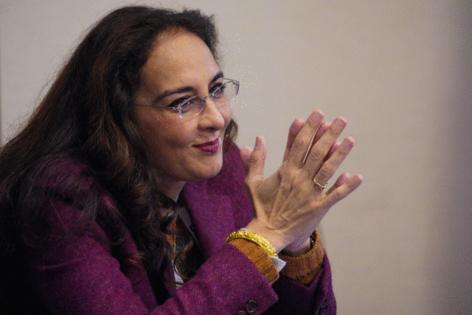Trump's 'culture defender' set to remake DOJ civil rights unit
Published in News & Features
WASHINGTON — The civil rights division of the Justice Department has for decades protected the rights of racial, ethnic and religious minorities, as well as women — the groups that have been the most common victims of illegal discrimination in the U.S.
President-elect Donald Trump’s choice to lead the office, Harmeet Dhillon, has a very different mission in mind.
In Dhillon’s view, it is often social conservatives, white people and men whose civil rights are threatened. According to people familiar with her intentions, she would use the office to champion their causes: Ending diversity and inclusion programs. Opposing medical care for transgender people. Fighting tech and media companies’ alleged bias against conservatives.
“She will have the power to yank the trajectory of what the Justice Department’s been trying to do in a very, very different direction,” said Susan Carle, a civil rights law professor at American University who worked at the Justice Department in the early 1990s. “The right-wing agenda has long been to define the persecuted class as white men and conservatives.”
Dhillon, 55, declined to comment on how, if confirmed by the Senate, she’d approach the role.
Based in California, Dhillon runs an eponymous law firm with offices around the U.S. She’s served as Trump’s personal lawyer in several cases, defending him against state efforts to have him removed from the presidential ballot, a California lawsuit from adult film actress Stormy Daniels, and subpoena requests from a congressional committee investigating the Jan. 6 Capitol Hill riots.
She was also a legal adviser to Trump’s 2020 campaign, fighting state laws aimed at improving access to voting in Pennsylvania and, in frequent interviews on Fox News, repeating unsubstantiated allegations of voter fraud in swing states. “If we roll over and play dead or let the Democrats just scratch our bellies like obedient dogs, we can count on never winning an election again in this country,” Dhillon said in a 2020 Fox News interview.
The civil rights division has jurisdiction over voting rights laws.
“She’s quite close to President Trump,” said Ron Coleman, a lawyer with Dhillon’s firm. “They’re in regular communication, and have been for many, many years. This is a perfect way for that relationship to be realized.”
Dhillon immigrated from India with her parents in the mid-1970s. She began to establish her conservative credentials as an undergraduate at Dartmouth College, where she was the editor of the Dartmouth Review when it published article criticized by some as anti-semitic; she defended the piece in an op-ed in The New York Times. After law school at the University of Virginia, she clerked for Paul Victor Niemeyer, a George H.W. Bush appointee, on the Fourth Circuit Court of Appeals.
In some of her best-known cases, Dhillon has argued that conservatives were the victims of illegal discrimination. In 2017, she successfully represented a student group suing the University of California, Berkeley over restrictions on events featuring right-leaning speakers. Berkeley settled the lawsuit and modified its procedures for handling major events.
She also represented James Damore in a suit against Google, alleging that the company discriminated against the software engineer who circulated a memo opposing the search giant’s diversity, equity and inclusion policies. The case was resolved out of court.
Those are the types of cases she’s worked on throughout her career, Coleman said, calling her a “culture defender.”
During the COVID-19 pandemic, Dhillon brought suits that challenged vaccine mandates, rules preventing public gatherings and policies restricting travel from the U.S. One of her cases reached the Supreme Court, which found for Dhillon’s client and struck down a federal mandate that large businesses require their employees to be vaccinated or tested.
Through her Washington-based nonprofit, the Center for American Liberty, Dhillon has championed suits against doctors who provide gender-affirming care to minors and cases that would require school districts to notify parents if a student wants to change the name or pronouns they use at school.
“Make it unsafe for American doctors to destroy young American lives through the lie of sex change aka ‘gender transition,’” Dhillon said in a post on social media platform X in May. “Expand the statutes of limitation. Make insurance paying for these procedures also pay for detransition. Make it stop.”
In several cases, judges have rejected Dhillon’s arguments on behalf of parents. In one instance, a California judge affirmed a local school district’s “legitimate interest” in protecting transgender students from a variety of hostile reactions, “including but not limited to domestic abuse and bullying.”
In addition to her Trump ties, Dhillon has a long history with the Republican Party, serving as the Vice Chair of the California GOP, then as a member of the Republican National Committee. In 2022, she sued Google on behalf of the RNC, which alleged that its emails were disproportionately sent to Gmail spam folders. (A judge dismissed the case in June.) In 2023, she ran for RNC chair, losing to Ronna McDaniel.
Opposition to Dhillon is growing among Democrats and major civil rights groups. “Dhillon has spent her career eroding public trust in our electoral process and participating in a larger effort to undermine racial equity initiatives,” said Janai Nelson, president of the Legal Defense Fund, a racial equity legal group.
And Maya Wiley, CEO of the Leadership Conference on Civil and Human Rights, pointed to Dhillon’s record, including her defense of former Fox News host Tucker Carlson against charges of gender discrimination. “This is about how far afield she is from a bona-fide record of being a civil rights enforcer,” Wiley said. “She’s much more of an ideological activist.”
©2024 Bloomberg L.P. Visit bloomberg.com. Distributed by Tribune Content Agency, LLC.







Comments